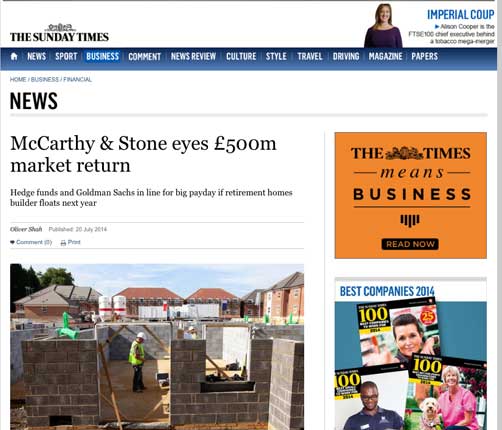So the sharper end of the City reckons its punt on retirement housing may pay off next year.
The Sunday Times article on the possible float of McCarthy and Stone was preceded by one in the FT, here
According to the FT a number of investment banks have been in contact with McCarthy and Stone to bid to advise its board on restructuring the debt.
“All options are being considered”, including going public “but an IPO is not an immediate leading preference at the moment, the source said”.
The FT also points out that an IPO failed to materialise in 2012.
We will have to wait and see.
A healthy retirement housing sector is undoubtedly a good thing.
Many elderly people dismiss the whole idea of living in a retirement complex, while for others – the bereaved, particularly – it can be life-enhancing. Loneliness and isolation blight the lives of millions.
But … the model has got to change.
Private retirement providers – and a fair number of the “charitable” housing associations – have been too greedy for too long and they have caused the reputational damage that now faces the sector.
Here they are (again):
- Leases were created with sneaky revenue-earners;
- Ground rents are set higher than the rest of the housing sector;
- Management fees were padded;
- Insurance contracts were loaded;
- Large-scale, systematic corporate price-fixing through collusive tendering is established;
- Capital values plummet, and do not track the local property market;
- And – perhaps the biggest scandal of all – communal assets, typically the house managers’ flats, have been stripped out of sites and sold off by, or loaded with debt to fund corporate restructuring.
Three OFT inquiries into the sector have been undertaken, and retirement will feature into the current leasehold management inquiry being undertaken by the OFT’s successor the Competition and Markets Authority.
The heart of the problem is English leasehold law, with its many opportunities to monetise. It has proved an irresistible temptation in the hands of the property business.
As the articles on LKP illustrate, fighting back is difficult even for employed professionals. The elderly in retirement leasehold can be very vulnerable indeed.
Campaign against retirement leasehold exploitation is full of admiration for those residents who have fought back such as those in Elim and Regent Courts, in Plymouth; Strand Court, in Rye; Metcalfe Court, in Romilly; Mere Court, in Knutsford; Hall Mews, Boston Spa etc
It is vital that the previous practices in retirement housing provision are not repeated.
House builders – and not just in retirement – have seen their reputations tarnished after selling on freeholds of sites to those intent on monetising the asset systematically.
Campaign against retirement leasehold exploitation has suggested changes:
1/ Build commonhold (we understand AgeUK is examining this as a proposal). Free and unencumbered commonhold would be an excellent proposal in retirement housing.
But Campaign against retirement leasehold exploitation would sound a note of caution: “managed” freehold retirement sites can have even more legal complications than leasehold, as the prime minister discovered at Windrush Court, in Burford.
Here freehold houses were encircled by the freeholder’s gardens, drive etc leading to various try-ons that could not be contested in the LVT.
2/ Build with a residents’ management company. House builders should break the potential for a freeholder to monetise a site. An RMC from the start would mean that disgruntled sites don’t have to fight for right to manage. It is surely disgraceful that the RTM of Regent Court went all the way to an application to appeal (thrown out) to the Court of Appeal and the residents only achieved RTM two years after they won it?
The only retirement house builder that Campaign against retirement leasehold exploitation is aware of which does this is Retirement Security Limited, headed by Bob Bessell. (It is currently expelled from the craven and pointless trade body the ARHM, because Mr Bessell spoke out in support of an ARHM employee he thought was being badly treated.)
3/ Have a recognised residents association from the start. It has one power: to appoint a surveyor – usually, in fact, an auditor – to examine the freeholder’s books. To resist this, a freeholder spent £75,000 on a QC and other legal gunfire in April. More here
Obviously, the elderly moving into a retirement site don’t want to hear about recognised residents’ associations or residents’ management companies or right to manage.
They want to retire.
But when there is a problem – like a £140,000 bill for a new roof that isn’t covered by insurance – these protections become very important indeed.
A few months ago the retirement developers launched the Campaign for Housing in Later Life, fronted by Esther Rantzen and others – she rightly sees communal living for the elderly as highly desirable.
But the campaign has proved to be an utter disaster, more here: AgeUK would not join; Shelter resigned when Campaign against retirement leasehold exploitation / LKP began making a fuss and then Peverel was expelled because of the Cirrus collusive tendering scandal.
The campaign showed every sign of no lessons learned; just carry on with the retirement leasehold jamboree as in the past.
And why on earth was Peverel invited to take part – six months after an OFT ruling against it?
Recently, however, there have been signs of purposeful dialogue.
Campaign against retirement leasehold exploitation has met McCarthy and Stone and came away very encouraged.
The issues that cause our concerns are not the core business of a house builder, who draws up the lease.
The core business of a house builder is to build and sell houses, ideally to people who are happy with their purchase and will recommend others.
Compared with that, the extra earners involved in being clever with leasehold are a small consideration.
We will meet the members of the Campaign for Housing in Later Life next month.
























